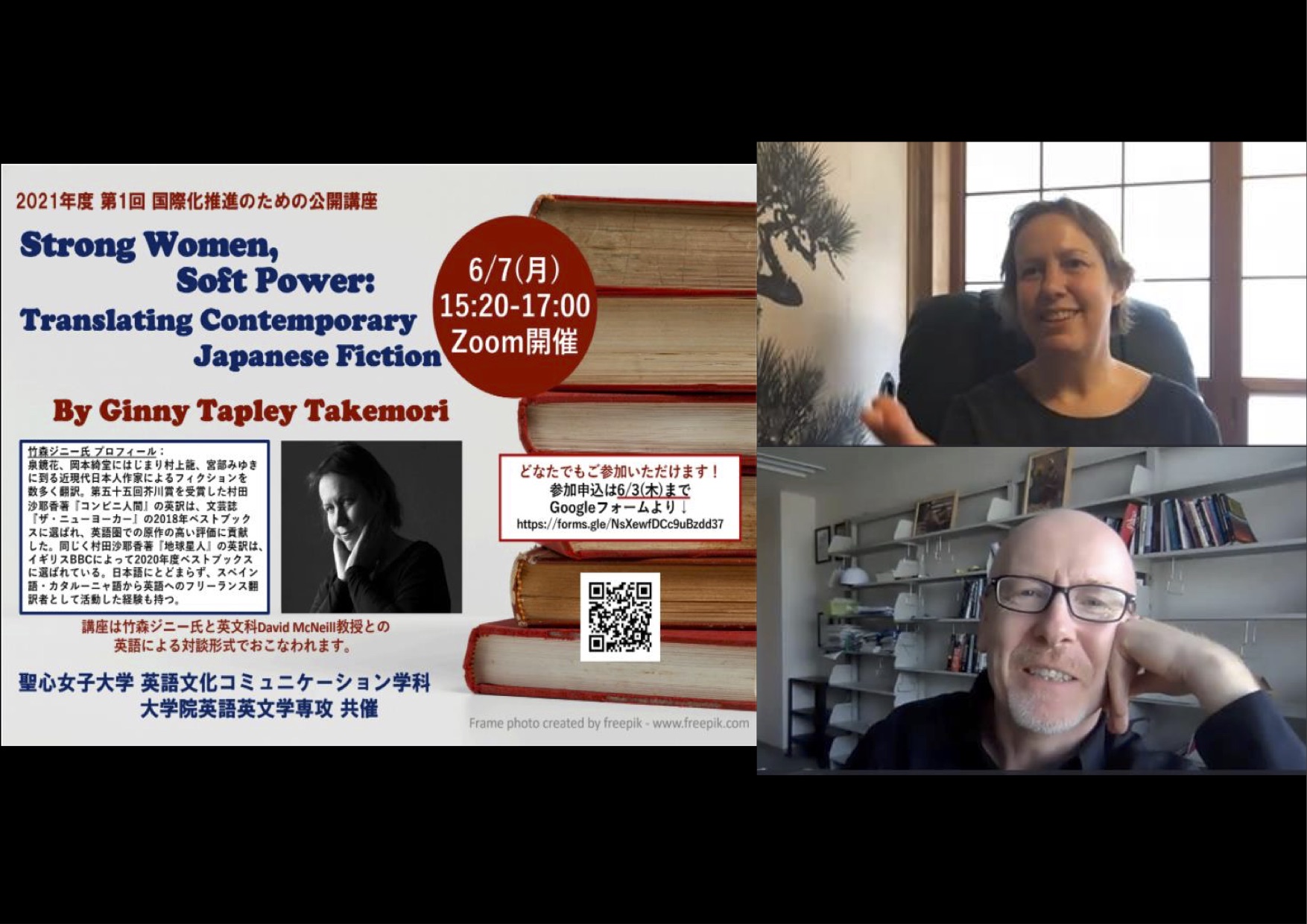BLOG
“Strong Women, Soft Power: Translating Contemporary Japanese Fiction” 2021 国際化推進のための公開講座(第1回)(実施報告)

“Strong Women, Soft Power: Translating Contemporary Japanese Fiction”
2021 国際化推進のための公開講座(第1回)実施報告
2021年6月7日(月)、泉鏡花、岡本綺堂にはじまり村上龍、宮部みゆきに到る近現代日本人作家によるフィクションを数多く翻訳されてきたGinny Tapley Takemoriさんを迎え、「国際化推進のための公開講座」をオンラインで開催しました。講座は本学David McNeill教授との対談形式で行われました。第五十五回芥川賞を受賞した村田沙耶香著『コンビニ人間』の英訳作業について、翻訳家として大切になさっていることなど、大変貴重なお話を伺うことができました。学生たちの感想を掲載します。
◆ I realized that translating a book into a different language is a great work, but it is also very difficult work because Ms. Takemori needs to understand what the author wants to tell the readers, not just translating. It is sometimes not easy to translate ambiguity, so I thought it is difficult to express some expressions in another language. I understood the hard work of translating, but also I could see how Ms. Takemori likes translating. (Rion)
◆ I learned that a translator has to recreate the author’s worldview. I realized that their job is like that of a painter who thinks about how an author created the fictional world, decides how to recreate that world, and then paints it. (Hikari)
◆ I learned it is difficult to think about the Japanese writing system, such as hiragana, katakana, and kanji, and the proper use of words depending on the position. In addition, I learned that it is necessary to be careful in translating dialects; therefore, Ms. Takemori carefully translates individual words. This lecture was very interesting because even though my mother tongue is Japanese, I did not notice these important distinctions. (Reina)
◆ I found so many reasons why a translator needs to change the original expression so that readers could understand the things and characters that appear in the work. What was particularly impressive is that translators need to be aware of foreign accents or dialects because pronunciations such as found in dialects are important to express the characteristics of the character itself. It is very surprising that she decided to translate Japanese food based on the knowledge of Japanese food being well known in other countries. I also feel knowledge from a wide perspective is very important in translation. (Yui)
◆ I was particularly impressed by the fact that Ms. Takemori said that she was still in the process of learning about Japan while translating many Japanese books. I wanted to learn from her attitude of being exposed to a lot of Japanese literature, but not being satisfied with it and still learning about Japan. (Kanon)
◆ Before listening to today’s lecture, actually, I did not know that the works by women authors are less translated to other languages than the work of men. I learnt that Ms. Takemori’s work is not only to introduce Japanese literature to the world, but also to encourage women authors all over the world. I was a little surprised that some foreign people recognized the symptoms of Keiko in The Convenience Store Women as autistic. I know Keiko’s way of thinking is quite strange, but I also empathize with her in some aspects. It is very interesting to see the differences in reactions depends on the culture, and as Ms. Takemori introduced to us, Sayaka Murata’s idea of books as a musical score and the reader as the musician gives us the freedom of reading. I also learnt that when translating literature, not only the knowledge, but also an abundant imagination, kindness for readers, and most importantly, the skill to read the words accurately is needed. I appreciated the opportunity of participating in such a wonderful lecture. (Ari)






